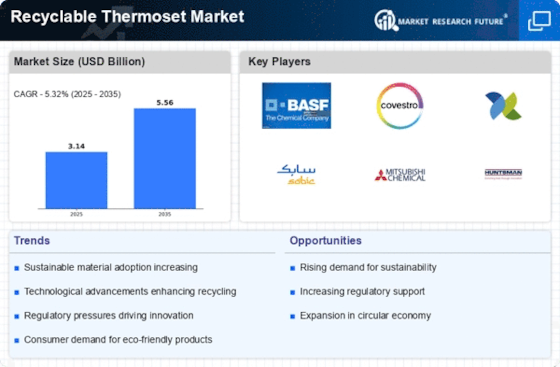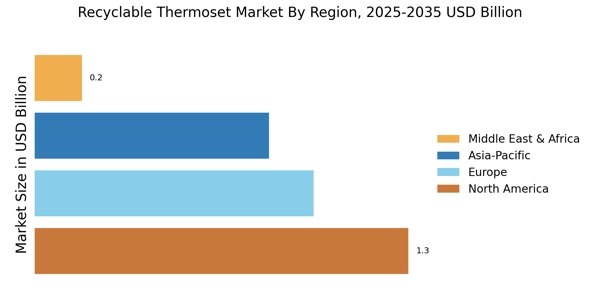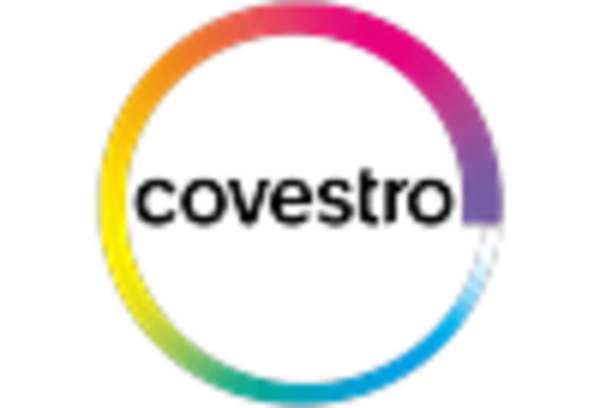Regulatory Frameworks
The establishment of supportive regulatory frameworks is a significant driver for the Recyclable Thermoset Market. Governments worldwide are implementing stringent regulations aimed at reducing plastic waste and promoting recycling. These regulations often incentivize the use of recyclable materials in manufacturing processes. For example, policies that mandate the use of recycled content in products are becoming more common, thereby creating a favorable environment for recyclable thermosets. The Recyclable Thermoset Market stands to gain from these regulatory measures, as they encourage manufacturers to invest in research and development of recyclable thermosetting materials. Additionally, compliance with these regulations can enhance a company's market competitiveness, as consumers increasingly favor brands that demonstrate environmental responsibility. The potential for government support in the form of grants and subsidies further bolsters the industry's growth prospects.
Technological Innovations
Technological innovations play a crucial role in shaping the Recyclable Thermoset Market. Advances in material science and engineering have led to the development of new thermosetting polymers that can be recycled more efficiently. For instance, the introduction of reversible thermosets has opened avenues for recycling processes that were previously unfeasible. This innovation is expected to enhance the recyclability of thermosets, making them more appealing to manufacturers. Furthermore, the integration of automation and smart technologies in recycling facilities is likely to improve the efficiency of recycling operations. As a result, the Recyclable Thermoset Market is witnessing a transformation that aligns with the growing demand for sustainable materials. Market analysts suggest that the adoption of these technologies could lead to a significant reduction in production costs and waste, thereby attracting more players to the industry.
Sustainability Initiatives
The increasing emphasis on sustainability initiatives is a primary driver for the Recyclable Thermoset Market. As industries strive to reduce their carbon footprints, the demand for materials that can be recycled and reused is surging. This shift is evident in sectors such as automotive and construction, where recyclable thermosets are being integrated into product designs. According to recent data, the market for recyclable materials is projected to grow at a compound annual growth rate of over 10% in the coming years. Companies are increasingly adopting circular economy principles, which not only enhance their brand image but also comply with evolving consumer preferences for eco-friendly products. The Recyclable Thermoset Market is thus positioned to benefit from this trend, as manufacturers seek to innovate and develop new formulations that meet sustainability goals.
Collaboration and Partnerships
Collaboration and partnerships among stakeholders are emerging as a vital driver for the Recyclable Thermoset Market. Companies are increasingly recognizing the value of working together to advance recycling technologies and develop new materials. Collaborations between manufacturers, research institutions, and environmental organizations are fostering innovation in the field of recyclable thermosets. These partnerships can lead to shared resources, knowledge exchange, and accelerated development of sustainable solutions. Furthermore, joint ventures can enhance market reach and facilitate entry into new markets. The Recyclable Thermoset Market is likely to benefit from these collaborative efforts, as they can lead to the creation of more efficient recycling processes and the introduction of novel products that meet consumer and regulatory demands.
Consumer Demand for Eco-Friendly Products
The rising consumer demand for eco-friendly products is a pivotal driver for the Recyclable Thermoset Market. As awareness of environmental issues grows, consumers are increasingly seeking products that align with their values. This trend is particularly pronounced in sectors such as consumer goods and electronics, where recyclable thermosets are being utilized to create sustainable alternatives. Market Research Future indicates that a significant percentage of consumers are willing to pay a premium for products made from recyclable materials. This shift in consumer behavior is prompting manufacturers to prioritize the development of recyclable thermosets in their product lines. Consequently, the Recyclable Thermoset Market is likely to experience robust growth as companies respond to this demand by innovating and expanding their offerings.

















